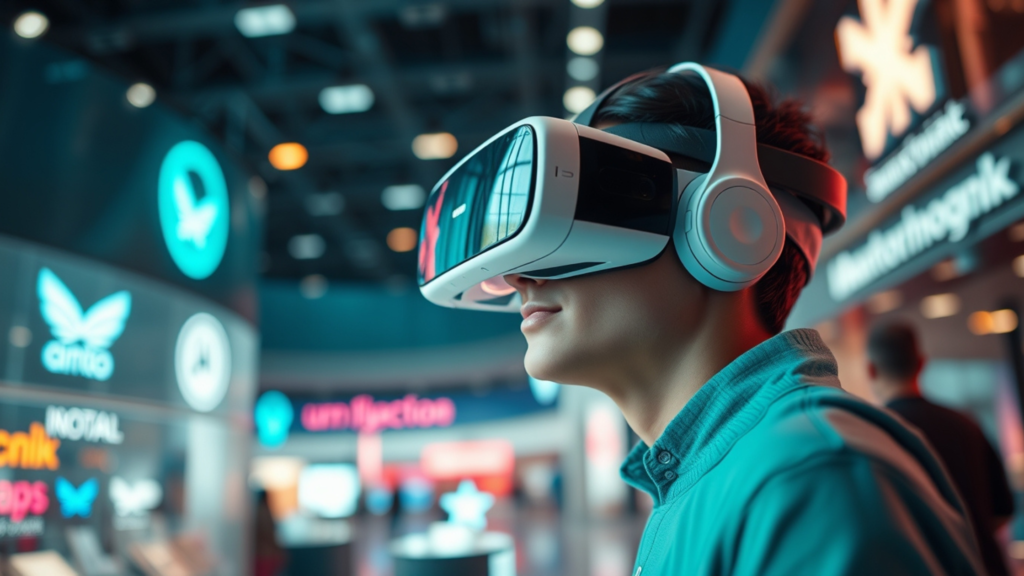Metaverse Marketing: 7 Proven Marketing Strategies for 2025

As the digital universe expands, the metaverse emerges as a revolutionary marketing platform, capturing the attention of tech-savvy consumers everywhere.
With forecasts suggesting the metaverse market will reach nearly $800 billion by 2024, understanding effective Metaverse Marketing strategies within this space is increasingly critical.
In this article, we explore key strategies that brands use to reshape their interactions with consumers in the metaverse, ensuring they stay ahead in the Digital Marketing Strategies race.
Immersive Brand Experiences

Case Studies of Successful Campaigns
- Nike’s Virtual Store on Roblox: Nike ventured into the metaverse by creating a virtual store on Roblox, setting a new benchmark for interactive customer engagement. This innovative space allows users to explore and interact with Nike products virtually, significantly enhancing Metaverse Advertising visibility and engagement.
- Gucci Garden in Roblox: Gucci adapted its artistic exhibitions for the virtual world by launching the “Gucci Garden” inside Roblox. This digital venue attracted over 4.5 million visitors in its first week, achieving impressive sales figures and demonstrating the powerful draw of well-crafted immersive digital marketing experiences.
Steps to Create Your Immersive Experience
- Platform Selection: Select a platform that resonates with your target audience, such as Roblox, Fortnite, or Decentraland.
- Design Interactive Environments: Develop engaging spaces that authentically represent your brand’s identity and ethos, filled with interactive elements that encourage user participation and exploration.
- Accessibility: Ensure that these virtual experiences are accessible across a broad range of devices to maximize user reach and inclusivity.
Leverage Virtual Influencers and Digital Personalities in Metaverse Marketing

Benefits of Virtual Influencers
Utilizing virtual influencers, such as those seen in Warner Music Group’s SandBox virtual concerts, showcases the potential to blend real-world and digital experiences. These digital personalities can attract and engage fans in ways that traditional marketing may not, offering unique, memorable interactions.
How to Utilize Digital Personalities
- Create or Collaborate: Build new or partner with existing virtual influencers that mirror your brand’s values and aesthetic.
- Engagement Strategies: Deploy these virtual personas in diverse marketing roles, from hosting events to spearheading new product launches to enhance visibility and consumer interaction.
Implement Blockchain and NFT Technology in Metaverse Advertising

Innovative Uses of NFTs in Marketing
Nike’s introduction of the “CloneX” digital sneakers represents a pioneering move in leveraging blockchain technology for marketing. This campaign not only sparked interest among collectors but also demonstrated how NFTs could drive brand engagement and create buzz in new markets.
Integrating Blockchain for Marketing
- Digital Collectibles: Develop collectible digital assets that embody your brand and can be traded or collected.
- NFT-Based Loyalty Programs: Create exclusive, NFT-centric loyalty rewards that offer unique value to customers, encouraging deeper brand engagement.
AI-Driven Personalization in the Metaverse
Enhancing User Experience with AI
Artificial intelligence technologies, including chatbots and virtual assistants, can guide and enhance the user experience within the metaverse. These tools provide personalized interactions, helping users navigate the virtual space effectively.
Examples of AI in Action
Utilizing AI to analyze user behavior and preferences allows for tailored content and interactions, which enhances user satisfaction and increases engagement rates.
Hosting Engaging Virtual Events in Digital Marketing Strategies

Case Study: Wendy’s Fortnite Event
Wendy’s “Food Fight” event in Fortnite demonstrated how virtual events could dramatically increase engagement and brand visibility. This initiative not only boosted social media interactions but also provided a blueprint for successful virtual event marketing.
Planning Your Virtual Event
- Choose the Right Platform: Identify a platform that aligns with your event’s objectives and can support the required interactive elements.
- Design Interactive Elements: Develop engaging and interactive features such as games and quizzes to maintain participant interest and activity during the event.
Optimize for Visual Search in Metaverse Advertising

Importance of High-Quality 3D Models
Ensuring your products are represented with detailed, high-quality 3D models is crucial for visibility and engagement in the visually-driven environment of the metaverse.
Visual Search Best Practices
- Image Recognition: Implement cutting-edge image recognition technologies to facilitate easy interaction and identification of your products by users.
- Memorable Design: Craft unique and visually striking brand elements that make your products stand out in the digital landscape.
Real-Time Analytics for Agile Marketing in Metaverse Marketing Agency Strategies

The Power of Real-Time Data
Setting up real-time data monitoring within your virtual environments allows for agile marketing tactics, enabling quick adaptations based on user interactions and behaviors.
Using Analytics to Drive Decisions
Apply A/B testing and leverage analytics to forecast trends and refine marketing strategies, ensuring they effectively resonate with your target demographic.
Conclusion
Embracing these innovative marketing strategies will not only position your brand at the forefront of the digital marketing frontier but also establish you as a leader in the evolving metaverse landscape.
As the boundaries of digital and physical worlds continue to blur, integrating these advanced marketing techniques is crucial for crafting impactful, engaging consumer interactions that resonate well into the future.
Dive into the metaverse with confidence, equipped with these proven strategies to elevate your marketing game.
Saletancy: Your Digital Marketing Partner
Looking for a trusted partner to guide your business through the complexities of digital marketing?
Saletancy is here to help. As a seasoned digital marketing agency, we understand the unique challenges and opportunities that come with promoting your brand in the digital world.
From crafting tailored strategies that enhance your online presence to executing campaigns that drive real results, our team of experts is committed to helping your business thrive.
Whether you’re exploring the potential of metaverse advertising, seeking to optimize your content for SEO or need assistance in deploying cutting-edge marketing technologies like AI and blockchain, Saletancy has the expertise to elevate your marketing efforts.
We work closely with each client, ensuring that every marketing move aligns perfectly with their goals and audience.
Choose Saletancy and take your digital marketing to the next level.
FAQs: Mastering the Metaverse: 7 Proven Marketing Strategies for 2025
What is metaverse marketing?
Metaverse marketing refers to the use of virtual and augmented reality platforms, like the metaverse, to promote products and services. This form of marketing enables brands to create immersive and interactive experiences that engage users in a digital, three-dimensional environment.
How does advertising work in the metaverse?
Advertising in the metaverse often involves creating virtual spaces or events where brands can interact with potential customers. This could include virtual billboards, branded virtual events, or interactive experiences that allow users to explore products or services in a detailed and engaging way.
What are the key strategies for marketing in the metaverse?
Key strategies for metaverse marketing include:
- Creating immersive brand experiences in virtual environments.
- Utilizing virtual influencers and digital personalities to engage with users.
- Leveraging blockchain and NFTs for unique promotional opportunities.
- Implementing AI-driven personalization to enhance user engagement.
- Hosting virtual events to reach a global audience.
- Optimizing content for visual search within virtual platforms.
- Using real-time analytics to adapt strategies based on user behavior.
What platforms are best for metaverse marketing?
Popular platforms for metaverse marketing include Roblox, Fortnite, Decentraland, and The Sandbox. Each platform offers unique features that can be leveraged for different types of interactive marketing campaigns.
Can small businesses market in the metaverse?
Yes, small businesses can market in the metaverse by focusing on niche communities and leveraging lower-cost virtual events or smaller-scale immersive experiences. Partnerships with existing virtual spaces and influencers can also be a cost-effective approach.
What are the challenges of metaverse marketing?
Challenges include the high cost of technology and development, the need for specialized skills, the rapid pace of technological change, and the difficulty of measuring ROI. Additionally, brands must ensure that their virtual experiences are accessible and engaging for a diverse audience.
How do I measure the success of my metaverse marketing campaigns?
Success in metaverse marketing can be measured through engagement metrics such as user participation rates, time spent in virtual environments, and social media mentions. Sales of virtual goods and services, as well as the growth in brand awareness and customer loyalty, are also key indicators.
What future trends are expected in metaverse marketing?
Future trends include the integration of more advanced AI for personalization, the growth of blockchain for secure transactions, and the expansion of AR and VR technologies to enhance user experiences. Additionally, there will likely be a greater focus on sustainability and ethical considerations in virtual marketing practices.
What are the 8 pillars of the metaverse?
The 8 pillars of the metaverse are considered foundational elements that support its creation and ongoing evolution:
- Presence: The feeling of being physically present in a virtual environment.
- Interoperability: The ability for various metaverse platforms to work together seamlessly.
- Standardization: Common standards that allow for consistent and compatible user experiences.
- Spatial Computing: Technologies that combine physical and digital worlds in a three-dimensional space.
- Creator Economy: Tools and systems that allow users to create, own, and monetize their content.
- Decentralization: Distribution of power and control away from any single entity, often supported by blockchain technology.
- User Governance: Systems that allow users to help govern and shape the direction of the metaverse.
- Sustainability: Initiatives to ensure the metaverse operates in environmentally and socially responsible ways.
What will marketing in the metaverse look like?
Marketing in the metaverse is expected to be vastly immersive and interactive, offering brands new ways to engage consumers:
- Virtual Experiences and Showrooms: Brands can create detailed, three-dimensional showrooms and experiences where consumers can explore and interact with products.
- Personalized AI Interactions: Marketing will leverage AI to provide highly personalized experiences, recommending products and services based on user behavior and preferences.
- Enhanced Social Interaction: Marketers will utilize social platforms within the metaverse to facilitate real-time interactions and events, increasing engagement through community-based experiences.
- Use of Augmented Reality (AR): AR will play a significant role, allowing consumers to visualize products in the real world and enhancing decision-making processes.
- Integrated E-commerce: Direct purchasing options will be integrated into virtual environments, allowing users to buy products instantly while experiencing them virtually.
- Gamification: Incorporating game-like elements into marketing strategies to increase engagement and provide value through entertainment.